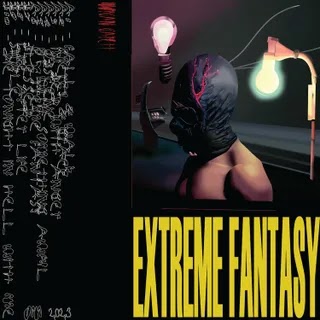On his new three-song EP, the Baltimore artist uses his sinuous, stunning voice to navigate a dark night of the soul.
As serpentwithfeet, Josiah Wise wields his powerful, choir-trained voice to reach for the sublime. His elastic vibrato adds urgency to lyrics about the hazards and highs of queer love, occasionally multiplying into a sweeping chorus to deepen the sense of grandeur. On Apparition, the Baltimore artist’s new three-song EP, he invites listeners into his dark night of the soul. Where soil largely lamented the pitfalls of romance, Apparition takes a more introspective approach, as Wise rids himself of emotional baggage. His outlook remains generous and full of light, and the songs brim with the strength necessary to make it to tomorrow.
Apparition opens with a dancing piano figure on “A Comma,” like a sequence from an étude. It contradicts the weariness to come, in which Wise strains to break free from expectations over heavy, rolling bass and drums. “Someone else’s beasts are riding me/I know this pain isn’t mine,” he sings ruefully, “Yet I feel it all the time.” His vocal delivery is tremulous, the background filled with ghostly, wordless vocalizations and fraught silences. He wants to be an “open book,” to have agency and move the way he pleases, but the churning music beneath him suggests that it lingers out of reach. It’s a mental rut that Apparition’s beguiling eight minutes seek to remedy.
All three songs on the EP were produced by Wynne Bennett, who lent a similarly delicate touch to Janelle Monáe’s Dirty Computer highlight “Pynk.” Bennett’s understated production is a good fit for Wise, who continues to use his voice to land emotional haymakers. On “This Hill,” he is accented by airy, tinkling piano and clicking programmed drums as he explores a selfish melancholy, angry at the earth for “asking him to live this long” in misery. Wise finds a moment of epiphany halfway through, his voice careening to the fore. The repeated insistence that he’s “better now” feels unshakable, the layers of swooning harmonies giving biblical weight to overcoming self-doubt.
“This Hill” radiates a warmth that Wise maintains on “Psychic,” where his playful sense of humor comes to light. Here, he opens up to romance, cooing seductively to a “debonair soothsayer.” Wise chews into his spiritualist romantic object with unabated pleasure: “Shame on those who dread prophecy,” he sighs, “They must not know how hot it can be.” Bounding over echoing drums and a metronomic piano, “Psychic” recalls soil’s friskier songs like “slow syrup” and “fragrant,” where bawdy humor snuck into his poetic verses like glimpses of skin through fabric. Apparition proves that Wise moves in whatever sensuous direction he pleases, reckoning with himself head-on in order to break free and experience true connection.
👉👇You May Also Like👇👌
View the original article here
















0 comments:
Post a Comment